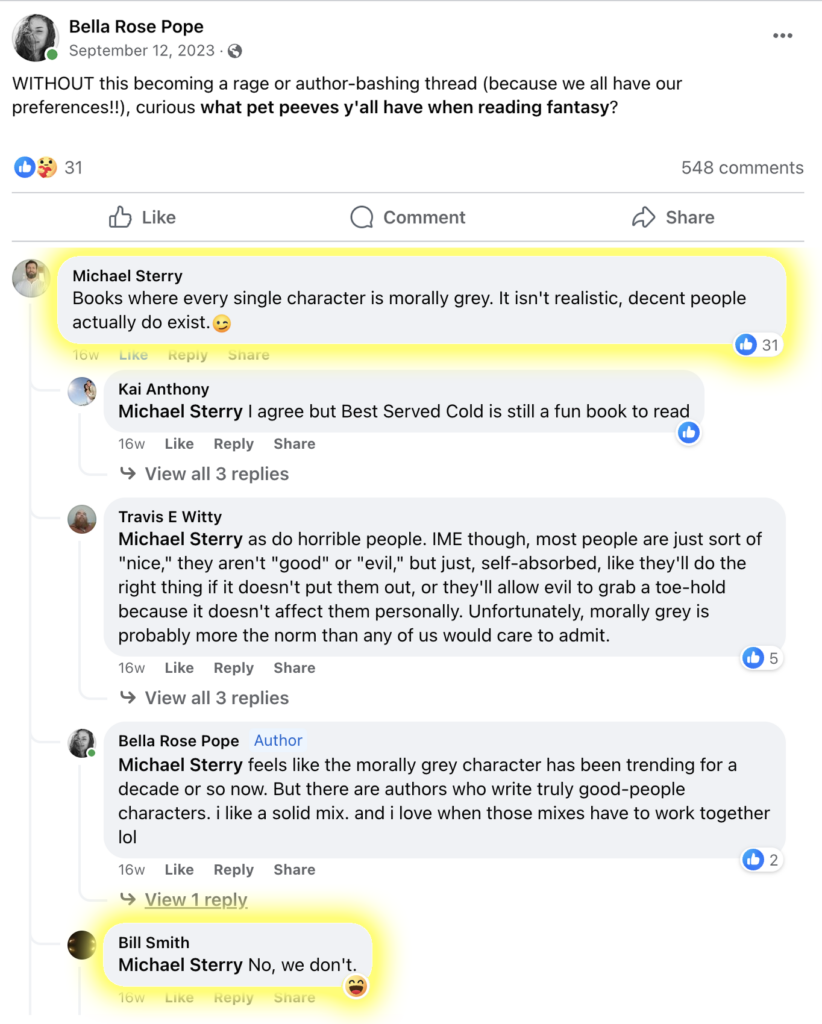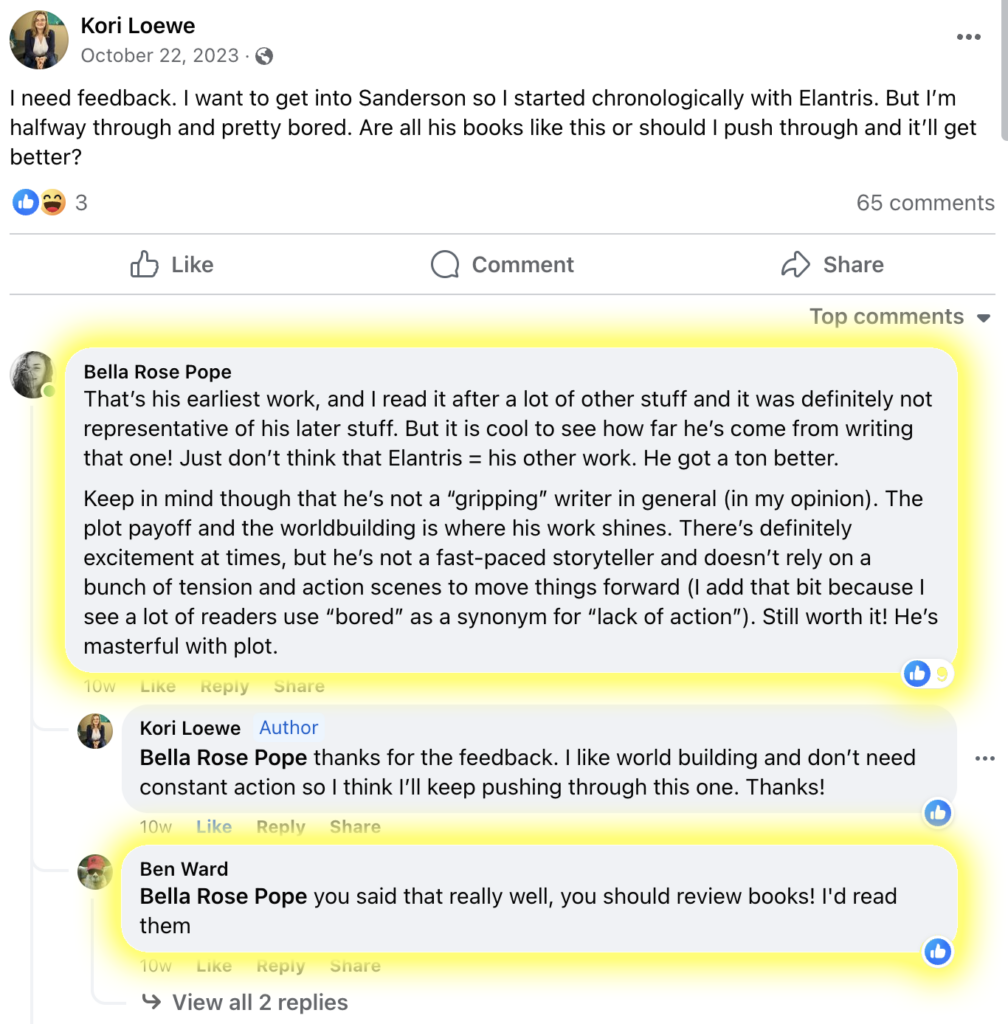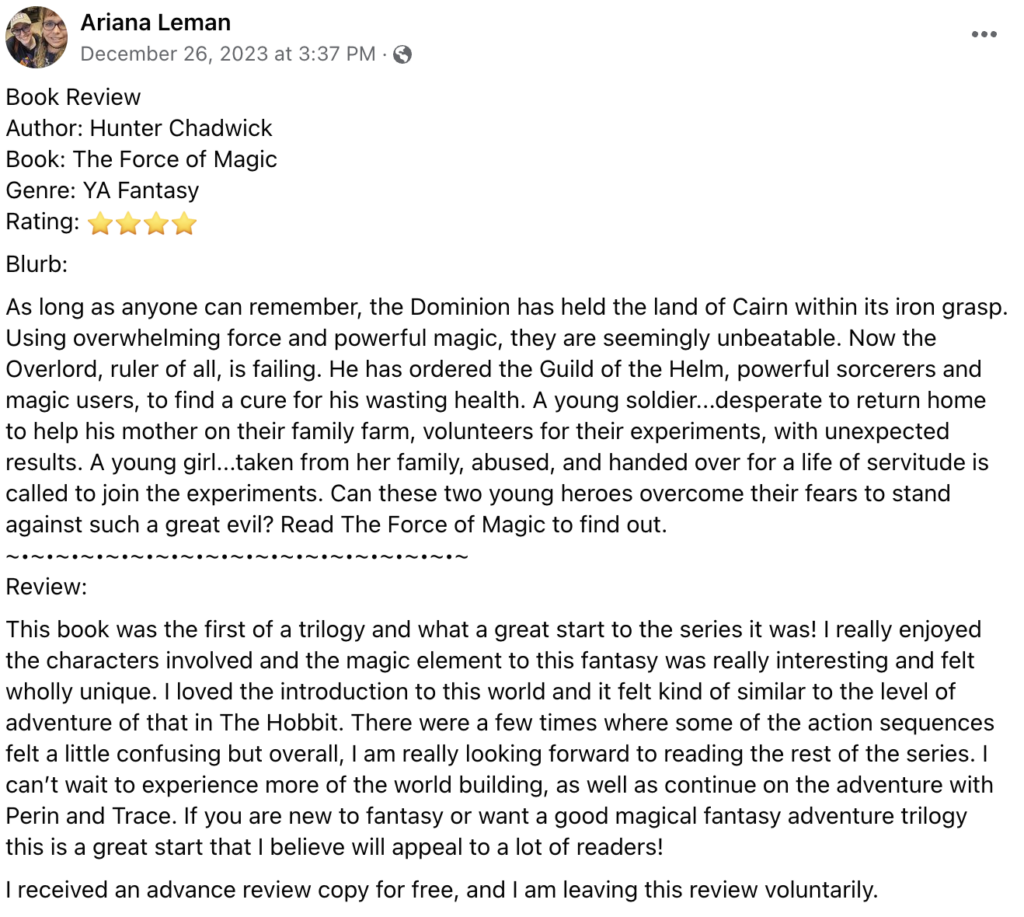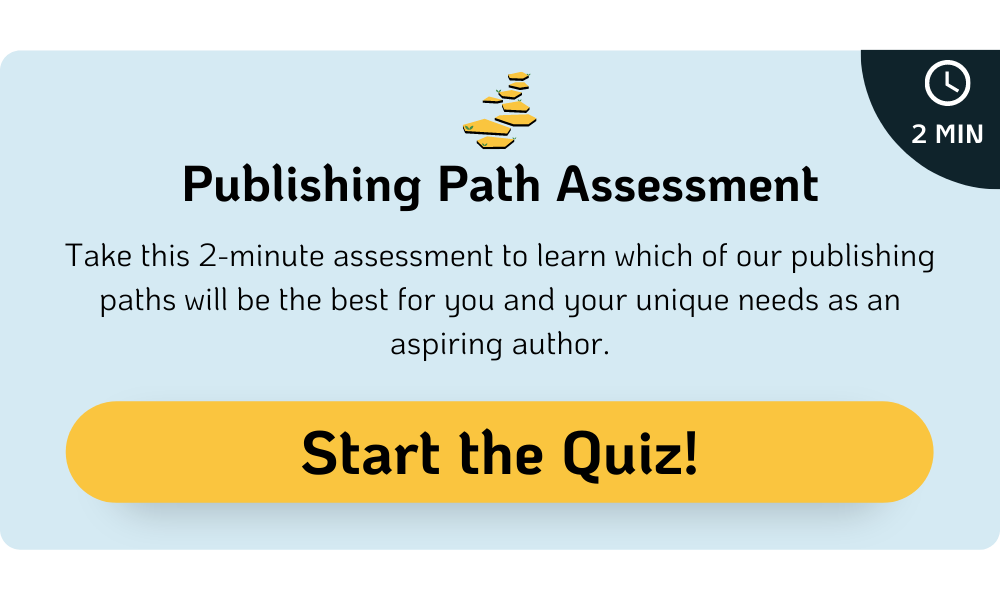Learning how to write a book review is useful for many reasons. Whether you need to get that assignment done or you want to grow a book review blog or newsletter, it can really help to lay out your reading experience in a way that allows others understand if they’d enjoy the book.
Plus, if you’re a beta reader or on someone’s launch team and have no idea what to say in your review, learning how to write a book review can help you feel like you’re fulfilling your commitment and helping sell an author’s book.
But you can’t just say whether the book was good or bad. That’s not helpful for anyone, no matter the reason you’re writing a book review. There’s more to it than that and more uses of a book review than you might expect.
Let’s take a look at those uses, the difference in types of book reviews, and how to write a book review that will fulfill your purpose for writing one.
Here’s what you’ll learn about how to write a book review:
Types of Book Reviews: Academic, Personal, Retail
Many need to learn how to write a book review because it’s been assigned to them. Others want to write these reviews for their platform, like a blog or newsletter, which I’d classify as “personal”. And of course, there are always those who just want to write one for friends or to participate in reader Facebook groups, and these also fall under the “personal” category.
There are differences between academic book reviews in a school setting and personal book reviews.
Academic book reviews: Typically these have a specific structure and format the writer needs to follow to fulfill the assignment. I’ll teach the format for this below, but instructors will often dictate certain requirements for the assignment. These are often meant to be about certain books, likely pulled from the syllabus or assigned reading.
Personal book reviews: More pleasurable for the writer, since they’re doing it because they enjoy it. These will often have a secondary purpose than just reviewing a book, which is where the location of publication comes into play; blog, email newsletter, Facebook post on page, Facebook post in group, a comment in a Facebook group, a video shared to Youtube. Many who write book reviews want to urge people to read the book through their affiliate link so they might collect a percentage of the book’s sale. Personal book reviews tend to have a more unique structure that’s dictated by the writer and what they tend to see and observe more when reading versus a standard format.
Book review on a retail website: While still somewhat of a “personal” book review, this one is what you would leave on a website where others who are choosing to buy the book or not can see it and use it to inform their purchasing decision. Many beta readers and launch team members fall in this category, often people who don’t know a thing about how to write a book review.
And of course, there are those who just write quick book reviews in a private journal for their own viewing and tracking, which follow no rules and are strictly for individual use, so I won’t talk much about that practice.
What makes for a good book review?
A good book review is not for the reviewer to display all they know of the literary world and talk down about an author. It’s to showcase the nuances of a book so the right readers can choose to read for themselves. And if the book is truly poorly written, a book review can serve as a means to uncover the reasons it didn’t deliver well, and even showcase how the author could have done better.
Book reviews are highly subjective, because everyone’s taste differs. What some people love about a book, others can’t stand.
This much is evident if you’ve spent any time in reader groups, like this Fantasy Faction group.

Personal opinions often affect the way we read a book, and that’s why a good book review uses more opinion, and ensures the reader of the review understands the writer’s worldview and perspective. Someone who doesn’t think there are any actually good people in the world will interpret a book filled with morally gray characters completely differently than someone who believes most people are good.
How to Write a Book Review: Formats & Structure
If you’re learning how to write a book review for academic purposes, yes there is a format that’s typically preferred, but there are actually a few of them. If you’re writing a book review for more personal reasons, there’s less of a structure but definitely elements you want to make sure you include.
Academic Book Review Format:
Your instructor may give you the format they’d prefer for you to use, but if you’re learning how to write a book review for academic purposes, you’ll have four main components.
Introduction:
This is where you’ll state the book, author, genre, and possibly the length of the book. You’ll also give a short synopsis of what the book is about, without too many details or spoilers. This helps the reader (your instructor) understand the overall makeup of the book so they can move through your review with a sense of the piece.
Book Contents or Outline:
If the book is separated into parts, beats, or have any other structural elements that are relevant, here’s a good place to touch on them. You’ll also go into more detail about the contents of the book, including the elements of fiction if it’s that type of book, or what’s covered throughout the book if it’s nonfiction.
This part can include details that may be spoilers, and hone in on aspects you’ll be reviewing further in the next section. If you’re going to highlight an author’s skillset in character development, for example, focus on outlining that journey in this section.
Opinion / Argument / Takeaway:
Many academic book reviews are aimed at a purpose. Sometimes it’s persuasive, and your job is convince the reader to buy the book. Other times it’s to demonstrate your ability to dive into a specific nuance of the content. No matter what that purpose is, here is where you’ll focus on making it known.
You’ll make your opinion clear and use specifics from the book to back it up.
If you’re making a case about a character’s development, you’ll want to cite pages, quotes, and bring up plot points and the character’s actions that support your opinion or argument. You can also just focus on your main takeaway of the book and do the same thing.
This section is more of the nitty-gritty of the book and will contain spoilers if it’s fiction and have content from within if it’s nonfiction.
Conclusion:
This should be short, and will contain a reiteration of your overall opinion of the book along with a summary of a few main points that support your opinion.
Personal Book Review Structure:
There’s a lot of wiggle room when it comes to learning how to write a book review for your blog, friends, or just to post on the book’s sales page online. These don’t have formats, necessarily, but you do want to touch on a few key elements to make a well-rounded review.
- Your rating out of 5 stars
- Whether or not the review contains spoilers
- A brief synopsis
- Whether or not you’re the book’s target audience
- If you read books like this often or not
- What you enjoyed most and why
- What you felt was lacking
- Things you were surprised by
- Your favorite character/s and why
- Things you’re looking forward to in the next (if it’s a series)
- If you would recommend the book to people and what type of person
Remember the purpose of the book review if it’s personal. Are you trying to get someone to buy the book? Are you highlighting a specific talent of the author you want others to see? Or are you supporting a new author by leaving a review that will help them sell more copies? All of that will dictate the structure and length of your book review.
If this is something you’ll continue to do often, you’ll fall into your own rhythm and end up creating your own sort of “structure” for the book review.
Examples of Well-Written Book Reviews to Learn From
Learning how to write a book review is more intuitive than you think. As long as you’re providing “evidence” to back up your opinion on the book, it’s a good review! Just saying whether it was good or back offers no insight for those deciding whether or not to purchase the book.
But as I usually say, learning from examples will help you more than any book review format I could give you, and you’ll learn pretty quickly how to write a book review.
Book Review Example 1 – Blog Post Review
Many book review bloggers nowadays take to Youtube, Instagram, and even TikTok to share their thoughts and grow their platform. But there are still book bloggers out there that serve a good example of how to write a book review.
This post is an example of a round-up style book review, where they cover various books, their thoughts, and whether or not they’d recommend them.
Book Review Example 2 – Comment in Group
This is one that will teach you how to write a book review in a short, concise manner that will answer someone’s question in a Facebook group, or even just in a text to friends. Here, someone even suggested I write book reviews because they liked the way it was said.

That’s his earliest work, and I read it after a lot of other stuff and it was definitely not representative of his later stuff. But it is cool to see how far he’s come from writing that one! Just don’t think that Elantris = his other work. He got a ton better.
Keep in mind though that he’s not a “gripping” writer in general (in my opinion). The plot payoff and the worldbuilding is where his work shines. There’s definitely excitement at times, but he’s not a fast-paced storyteller and doesn’t rely on a bunch of tension and action scenes to move things forward (I add that bit because I see a lot of readers use “bored” as a synonym for “lack of action”). Still worth it! He’s masterful with plot.
Notably here, I mention something pivotal to the original commenter’s concern: she’s bored. My explanation talks about the book, the author’s strengths, as well as touching on why a feeling of boredom can happen. Sometimes learning how to write a book review is also about seeing what most people are saying is wrong with the book and covering those components in your review.
Book Review Example 3 – Fiction Amazon Review
This is a review of a very popular book, one where the reviewer gave 3 stars. It’s important to understand that if you want to know how to write a book review, you’ll also need to know how to write one for books you don’t love. This reviewer did a good job of backing up her opinions with information from the book, without spoiling it.
“The first half of the book was challenging, it was a painfully slow and uneventful read. The writing is easy to follow but heavy on the internal dialogue and narration. There would be mere snippets of dialogue between characters, never a full-blown conversation. We mainly follow the main character, Feyre, as she’s lounging around an estate. Her days consists of walking around, painting, having dinner, and checking out the forest. The plot was pretty much dead until about 250 pages.
Due to the lack of interaction and dialogue, and Feyre just milling around, you don’t learn anything about… anything. I had no idea what the plot was, whatever was revealed was done so only in riddle or mystery. I can do with little world-building as long as the story thrives on other points, but this just fell flat all-around.
Tamlin, the love interest, is there… I liked him fine but felt that I learned nothing about him or his personality. It’s not an insta-love, per se, but there should’ve been more build-up and interaction, I don’t see where the physical attraction or emotional connection happened. Feyre and Tamlin were basically just skirting around each other, hardly having a meaningful conversation, so the sudden want for one another felt out of the blue.
Past the midpoint is where the story starts to pick up. There’s an info dump to catch the reader up on the plotline, the setting changes, and it generally becomes much more interesting and fun to follow along. It practically turned into a whole other book. Frankly, I was glad to get to the finish line and won’t be reading the rest of the series.“
Book Review Example 4 – Nonfiction Amazon Review
Nonfiction books typically serve a specific purpose. They’re teaching, informing, arguing, or enlightening in various ways. So when learning how to write a book review for nonfiction books, it’s vital to focus on whether or not there’s a solution, how it works, and a few of the other details of the book.
This reviewer did a good job of keeping it condensed, but voicing a reality of the book, and rating it 4 stars.
“The book seems to be intended for people that are looking for a set of practical guidelines towards understanding and limiting distractions. As such, it does a rather fine job at conveying a pretty thorough rule set for an indistractable life
The only thing that the book is missing is some ‘poetry’ or something to keep it interesting at times and also a structure that it would stick to. Although the book introduces the concept of indestractability on 3 planes : personal, home, work, it seems to not be keen on respecting the structure near the end of thr book.
Overall, I do recommend the book to anyone that is struggling with attention span and I give big kudos to the author.”
Book Review Example 5 – Facebook Post
You can keep your writing short and still know how to write a book review that gets the job done. This is what someone wrote about a popular book and their take on it. Notice how they specifically tell who this book is for and who would most enjoy it.
“
Legends and Lattes is a charming, lower key story that us fantasy lovers can enjoy without intense pressure on the hero to save the world. I don’t necessarily want to read about assassins on a mission gone wrong, sidekick-eating ogres or blood and gore befouling someone’s armour while eating breakfast. It was an awesome book to pick-up and casually read while slipping into a classic high-fantasy world with all of the familiar elements of magic, mystical creatures and heroes (my other current read, The Shadow of the Gods, is a little intense). I’m sad that it’s over and hope that Baldree churns out a few more.”
Notably, though, they did leave out an overall rating, which would make this a great book review. But that’s okay. As you can see, you can learn how to write a book review and get the point across without a full rating.
Book Review Example 6 – Facebook Post
This review is short, to the point, and covers the criteria we talk about above. Because it’s shorter, you won’t find too many details, but that’s because it’s spoiler-free. This was a post in a Facebook group and can serve as a great example of how to write a book review that doesn’t take a lot of your time, or what you can write if you’re on a launch team.

“Book Review
Author: Hunter Chadwick
Book: The Force of Magic
Genre: YA Fantasy
Rating:
Blurb:
As long as anyone can remember, the Dominion has held the land of Cairn within its iron grasp. Using overwhelming force and powerful magic, they are seemingly unbeatable. Now the Overlord, ruler of all, is failing. He has ordered the Guild of the Helm, powerful sorcerers and magic users, to find a cure for his wasting health. A young soldier…desperate to return home to help his mother on their family farm, volunteers for their experiments, with unexpected results. A young girl…taken from her family, abused, and handed over for a life of servitude is called to join the experiments. Can these two young heroes overcome their fears to stand against such a great evil? Read The Force of Magic to find out.
~•~•~•~•~•~•~•~•~•~•~•~•~•~•~•~•~•~•~
Review:
This book was the first of a trilogy and what a great start to the series it was! I really enjoyed the characters involved and the magic element to this fantasy was really interesting and felt wholly unique. I loved the introduction to this world and it felt kind of similar to the level of adventure of that in The Hobbit. There were a few times where some of the action sequences felt a little confusing but overall, I am really looking forward to reading the rest of the series. I can’t wait to experience more of the world building, as well as continue on the adventure with Perin and Trace. If you are new to fantasy or want a good magical fantasy adventure trilogy this is a great start that I believe will appeal to a lot of readers!
I received an advance review copy for free, and I am leaving this review voluntarily.”
Book Review Example 7 – Blog Post Review
This example of how to write a book review is done by a single person run website. She takes various books and does a write up on what she liked, didn’t and so on.
You can read this full review here, but there’s also a sample below.
“And I need to take a moment for Ravel, the boy who is so vicious and monstrous and spilling over with uncanny and inhuman claws and fangs–but yet is an absolute sweetheart deep down inside. The raw way he cherished Everline had me on the floor. Every time the book described Ravel, I was just [clenches fist] so enraptured. He is meant to be a mindless monster and Everline is confused why he seems so…human but yet not human. Their hatred for each other is so palpable, and the way they fall in love while still distrusting each other is addictive to read. It’s enemies-to-lovers the way I crave: claws and teeth and generational hatred and monstrous love.“
Part of learning how to write a book review has to do with self-awareness. If you don’t know why you like what you do, it’s hard to dictate that to other people. That said, if you’re an author, you need awareness of where you are in your publishing journey, our Publishing Path Assessment should point you in the right direction!
